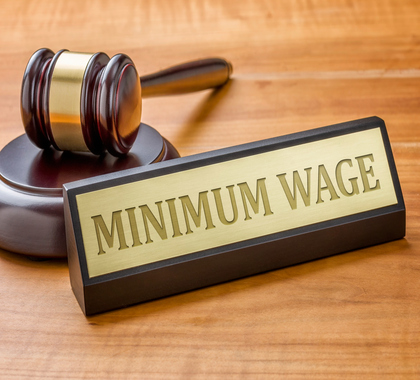Testimony Before the Ohio House Commerce and Labor Committee on Minimum Wage Increases
Heartland Impact
June 25, 2024
Chairman Johnson, and Members of the Committee:
Thank you for holding a hearing on House Bill 96, legislation that would increase Ohio’s minimum wage from $10.45 per hour to $15 by 2028.
My name is Samantha Vick, and I am the Senior Government Relations Manager at Heartland Impact.
Heartland Impact is the advocacy and outreach arm of The Heartland Institute. Both organizations are independent, national, nonprofit organizations working to discover, develop, and promote free-market solutions to social and economic problems. Heartland Impact specializes on providing state lawmakers the policy and advocacy resources to advance free-market policies towards broad-based economic prosperity.
Throughout 2024, every state in the nation has grappled with the many economic challenges that the year has brought. Inflation continues to make it difficult for middle class Americans to pay their bills, interest rates have risen, gas and energy prices are higher than before, and geopolitical issues around the globe continue to strangle the supply chain.
Historically, some state lawmakers have advocated for quick “fixes” in response to perilous economic situations, such as minimum wage hikes. However, minimum wage increases negatively impact businesses and individuals. Lawmakers in The Buckeye State would benefit from considering all the effects associated with such hikes.
A paramount concern surrounding increases in the minimum wage is the overall effect upon employment levels. Minimum wage hikes produce unintended consequences that often inflict even more pain upon the very people they are supposed to benefit. Though well-intentioned, minimum wage hikes are a substantial reason for the utilization of self-checkout kiosks by grocery chains and fast-food restaurants, which disproportionately eliminate jobs for vulnerable and low-income individuals.
A 2017 paper from the National Bureau of Economic Research (NBER) studies the effects of the aforementioned scenario, utilizing data collected from 1980 to 2015. The authors conclude that “increasing the minimum wage decreases significantly the share of automatable employment held by low-skilled workers… Our work suggests that sharp minimum wage increases in the United States in coming years will shape the types of jobs held by low-skilled workers, and create employment challenges for some of them.”
Further illustrating the negative utility of such a policy, a widely-cited joint study between the Federal Reserve and the University of California-Irvine found that 85 percent of credible studies on the subject clearly demonstrate job losses for low-skilled workers.
A study by the Congressional Budget Office (CBO) examines how increasing the federal minimum wage by incremental degrees to $15 per hour by 2025 would adversely affect employment and household incomes. While the study does find that a minimum wage increase boosts some workers’ wages, it also leads to job loss for many others, with small businesses often bearing the brunt of economic pain.
A minimum wage increase in Ohio would force small businesses to reallocate their costs to cover the increase in employees’ wages, ultimately forcing them to alter spending elsewhere to offset their newly increased labor costs. More times than not, this results in reduced hiring, a reduction in work hours, and increased prices for consumers. This is often the small margin between staying open and bankruptcy for small businesses, which typically operate on slim margins, to begin with.
A recent report from the Employment Policies Institute (EPI) found that a minimum wage hike would cost the U.S. economy approximately two million jobs. The EPI study notes that of those two million, the jobs most likely to vanish are in the restaurant and hospitality industries already steamrolled by the pandemic. Forcing small businesses in these industries to raise their labor costs would inflict even more harm upon the few that have managed to survive.
According to the U.S. Bureau of Labor Statistics, Ohio maintains a 4.0 percent unemployment rate. With additional economic uncertainty ahead, making any policy decisions that may lead to an increase in this rate should be avoided at all costs.
The country’s continued macroeconomic vulnerability is also important to consider. While unemployment rates have improved since their pandemic lows, the labor force participation rate has not rebounded in the same way. According to the U.S. Bureau of Labor Statistics, there were 8.1 million unfilled jobs on the last business day of April, according to their early June Economic News Release.
As for inflation, the June 2024 Consumer Price Index (CPI) report exposed that over the last 12 months, the all-items index increased 3.3 percent before seasonal adjustments.
Additionally, the cost of shelter for Americans increased 7.9 percent over the last year – the largest 12-month surge since June 1982, according to the U.S. Bureau of Labor Statistics.
Price increases in shelter, medical expenses, energy, gasoline, and food are felt by all Americans, with Ohio being no exception. According to Zippia, the average monthly cost of groceries per person in Ohio was $341.48 in 2023.
Although attempts to bolster a minimum standard of living and protect wage workers are laudable, the overall economic effects of forced minimum wage hikes accomplish neither of those worthy goals. Arbitrary minimum wage hikes, out of sync with the laws of supply and demand, would do little to lift struggling individuals and families in Ohio from poverty while destroying jobs and likely increasing government dependence.
Because of this, I implore all members of this committee to consider the serious consequences a minimum wage increase can have on employment rates and economic growth.
Thank you for your time today.


